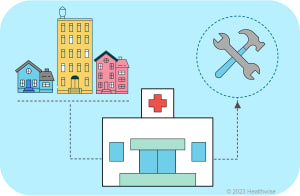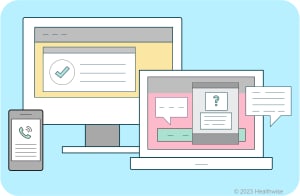Getting Help With Housing
Having a safe place to live that you can afford is important to your health. But for many people, it's hard to find housing that meets their needs. Maybe housing costs a lot, so they're sharing a crowded home. Or they may live in a home that needs repairs because of lead, water leaks, or other issues. Some people may not have a place to live.

If you need help getting housing or making home repairs, talk to your doctor, a social worker, or a faith leader. They can connect you to resources in your area.

You can also find help by going online to findhelp.org or benefits.gov or 211.org or by calling 211.
Where can you get help?
The programs that offer help with housing will depend on where you live. And you may need to give some information to help you qualify, such as your income, your age, or if you have refugee status. To find out more about a program, try looking it up online or asking at your local library. Here are some other tips and online resources.
-

U.S. Department of Housing and Urban Development (HUD).
HUD's voucher program helps pay rent. HUD can also help with home buying, home repairs, and finding rentals or local shelters. If you need help with housing for medical reasons, HUD has a form your doctor can fill out.
-

Emergency housing assistance.
There are resources to help you find housing right away.
- usa.gov/emergency-housing (or call 1-844-872-4681)
-

Low-Income Home Energy Assistance Program.
This program helps with energy bills and with home repairs that lower energy use, such as new windows or weather stripping.
-

American Red Cross.
If you've recently been through a natural disaster, the Red Cross may offer emergency housing in your area.
-

Bureau of Indian Affairs Housing Improvement Program.
This program is for Native Americans who qualify. It provides home repairs, new homes, or down payments for a home.
- bia.gov/programs-services/social-services
-

Supportive Services for Veteran Families.
It helps low-income veterans keep their homes or find new homes.
- va.gov/homeless/ssvf (or call 1-877-424-3838)
-

Housing assistance for teens.
If you're a teen and need housing, or if you know a teen who does, the National Runaway Safeline can help.
- 1800runaway.org (or call 1-800-786-2929)
-

Help for people who rent.
If you're having problems with your landlord, you may be able to find help.
-

Safe parking programs.
Some areas have programs that provide safe parking for people who sleep in their vehicles. Try calling a shelter to see if there's a program near you or to learn about local parking laws.
Credits
Current as of: October 1, 2025
Current as of: October 1, 2025